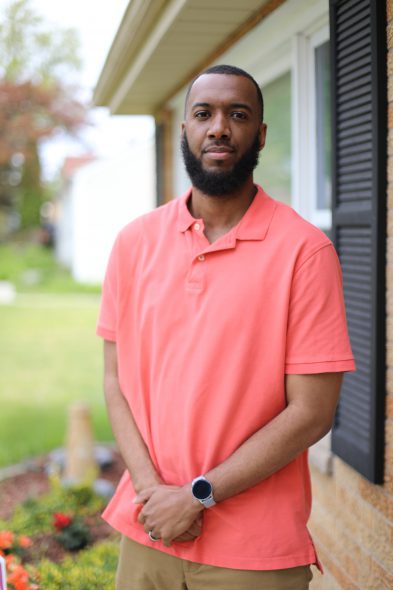My College Student Debt Is $152,000
UWM grad Clint Myrick explains his struggle with payments.

Clint Myrick is seen at his home in Milwaukee on May 10, 2021. Myrick graduated from the University of Wisconsin-Milwaukee in 2010 with a student loan debt that has since ballooned to over $150,000. Myrick said he understands why so many students take out loans without necessarily knowing how to pay them back. “They sell you on the dream. ‘Just take out the loans, and you’ll get a job where you’ll be able to pay that stuff back!’ You really believe it,” Myrick says. “They sell you on the dream. ‘Just take out the loans, and you’ll get a job where you’ll be able to pay that stuff back!’ You really believe it,” Myrick said. Credit: Coburn Dukehart / Wisconsin Watch
After we published the story about how many Black Wisconsin residents struggle with high student loan debt, several readers had questions about how the debt for Clint Myrick, a University of Wisconsin-Milwaukee alum, was able to reach $152,039.
Some questioned whether Myrick took steps to save and earn money. Did he live at home? Did he work during the summer? Why didn’t he use his diploma in music education to get a teaching job?
According to Myrick, the full backstory is complicated. A talented trumpet player, Myrick says he was naive about both the cost of college and his ability to put his degree to work after graduation. By the time he started college, Myrick already had child support to pay for his son. He spent weekends caring for him, cutting into the time he could work to earn money. Myrick switched majors several times, taking five years to graduate. Myrick’s family was in no position to help financially, he says.
“I was a poor college student like many others,” says Myrick, who graduated in 2010. “I was very active in campus life, which helped balance out the pressures of the real life issues, but it wears you down and eventually grades slip towards the end.”
As his grade point average plunged, Myrick lost his financial aid. When he graduated, he felt he couldn’t afford to spend a year as a student teacher without pay, so he never earned his teaching certificate.
Like many college graduates struggling to find a good job, Myrick took an internship, which inspired him to go to graduate school at UW-Milwaukee. Throughout that time, he worked for a catering company, but more debt piled up — for tuition, rent, meals and other living expenses.
“I dropped out of grad school due to stress, was late turning in final papers, but I realized somewhere that I didn’t want to be an educator anymore and wanted a change. So I had undergraduate debt, grad debt, and no major job,” Myrick says.
He says he was unable to afford payments for several years, and the debt grew “out of control.” Myrick recalls feeling “really depressed” on his 25th birthday “because I felt I haven’t accomplished anything and I’ve done so many wrong things while trying to do right.”
Myrick hopes his story serves as a warning to students tempted to take on unsustainable levels of debt — and against neglecting their grades, especially if they plan to go to grad school. A father of three, Myrick now works three jobs to support his family and pay back his loans. He has gotten offers of financial help from readers moved by his story. Despite some qualms, he set up a GoFundMe page.
“I desperately need the help for anyone willing to give it. However, I would feel survivor’s remorse for getting the help and many others with the same situation hadn’t gotten any help like me,” he says.
“I don’t want anyone else to go through these struggles,” Myrick adds. “Life could be and could’ve been much easier.”
This article first appeared on WisconsinWatch.org and is republished here under a Creative Commons license.![]()
-
Legislators Agree on Postpartum Medicaid Expansion
 Jan 22nd, 2025 by Hallie Claflin
Jan 22nd, 2025 by Hallie Claflin
-
Inferior Care Feared As Counties Privatize Nursing Homes
 Dec 15th, 2024 by Addie Costello
Dec 15th, 2024 by Addie Costello
-
Wisconsin Lacks Clear System for Tracking Police Caught Lying
 May 9th, 2024 by Jacob Resneck
May 9th, 2024 by Jacob Resneck


















“Wiping student loans across the board for Black folks … it would change everything.” — Quote attributed to Mr. Myrick in the original article. Hmmm. Something tells me that would be out of bounds re: equal treatment under the law regardless of race, gender, etc. True enough that it would “change everything” in the sense of racial tensions; just not in a good way.
I hope we can design a creative way to ease the hardship for debt-strapped young Americans and do so without inciting a race war, but it will have to be designed, promoted, and “sold” to voters as something ultimately good for the COUNTRY. Let’s accept that challenge as a society…acknowledging that we may not be able to pull that off. But here is what we CAN do going forward: Before anyone is cleared as eligible for a student loan or loans, cumulatively, in the amount of $XXX (maybe 10 grand?) they would have to complete a course in Financial Basics and Personal Economics — with a test and a Q&A interview. No more “I didn’t know”, or “how did this happen to me?” or, “my parents and teachers never warned me”.